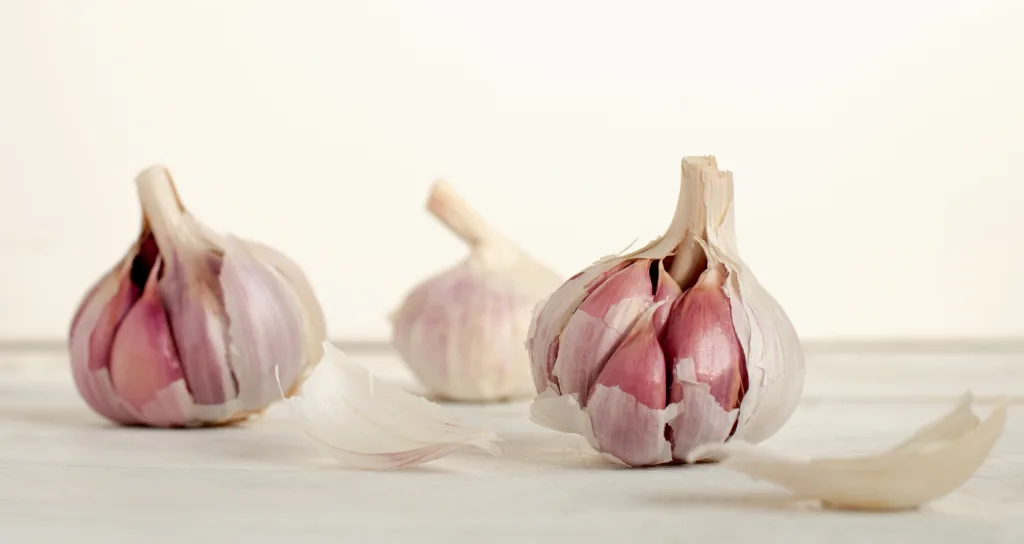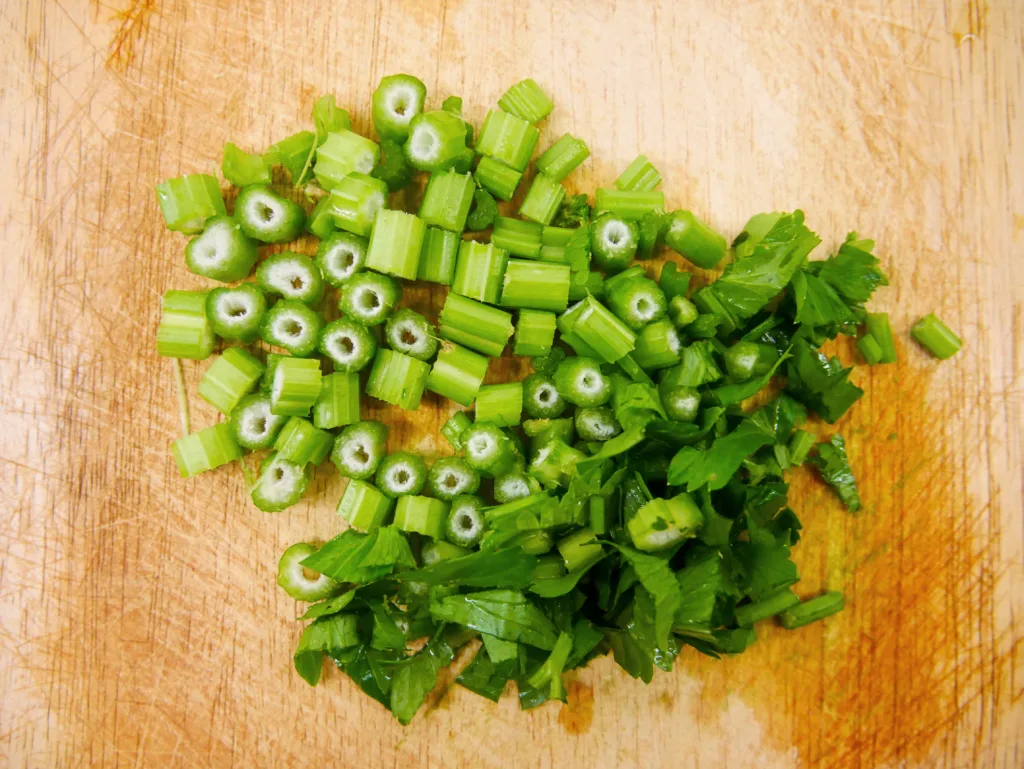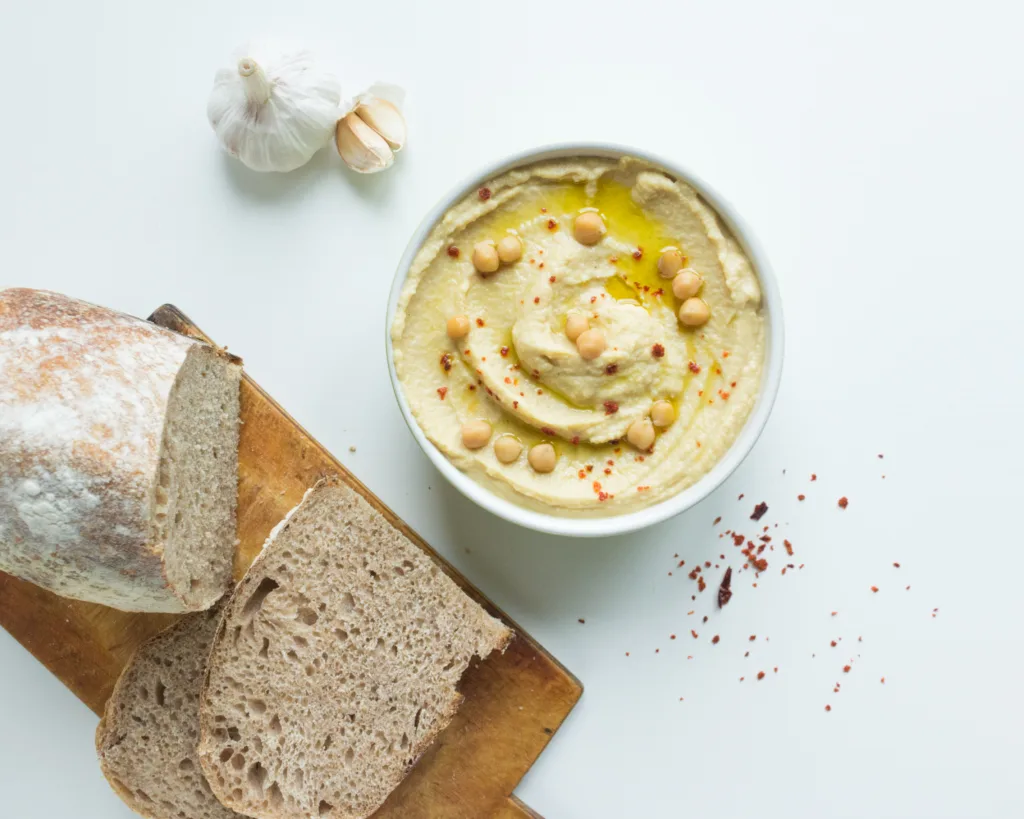Garlic is a widely used ingredient in many dishes due to its unique flavor and numerous health benefits. However, some people may experience digestive issues after consuming garlic, including bloating, belching, and gas. In this blog post, we will explore whether garlic really causes gas and what you can do to prevent it.
Garlic contains fructans, which are FODMAPs (fermentable oligosaccharides, disaccharides, monosaccharides, and polyols) that can cause bloating and gas. FODMAPs are a type of carbohydrate that some people have difficulty digesting, leading to the production of gas in the intestines. Fructans are also found in other foods such as onions, wheat, and artichokes, which are known to cause similar digestive symptoms.
However, not everyone experiences gas after consuming garlic. Some people may have a food intolerance to other compounds found in garlic, such as sulfur compounds or essential oils. These compounds can irritate the digestive system and cause bloating, heartburn, or gas.
If you experience gas after eating garlic, there are several things you can do to minimize its effects. One of the easiest ways is to cook garlic befoe consuming it. Cooking garlic breaks down its complex carbohydrates, making it easier to digest. You can also try using garlic-infused oil or garlic powder instead of fresh garlic, as they contain fewer fructans.
Another effective method to exploit the properties of garlic without having trouble digesting it, is to combine it with fresh aromatic herbs such as oregano, ginger, rosemary, basil, mint, or parsley. These herbs not only enhance the flavor of garlic but also have their own digestive benefits, such as reducing inflammation and promoting healthy digestion.
It’s also essential to pay attention to your portion sizes when consuming garlic. Eating too much garlic can overload the digestive system and lead to gas and bloating. Start by incorporating small amounts of garlic into your meals and gradually increasing the amount over time.
Garlic can cause gas in some people due to its fructan content, but it’s not the only culprit. If you experience gas after consuming garlic, try cooking it, using garlic-infused oil or powder, combining it with aromatic herbs, and monitoring your portion sizes. By taking these steps, you can enjoy the flavor and health benefits of garlic without having to worry about digestive issues.
The Effects of Garlic on Gas and Bloating
Garlic can cause gas and bloating. Garlic contains fructans, whih are FODMAPs that can cause digestive issues in some people. FODMAPs are short-chain carbohydrates that are not absorbed well in the small intestine and can cause fermentation and gas production in the large intestine. This can lead to symptoms such as bloating, flatulence, and abdominal discomfort.
Additionally, some people may have an allergy or intolerance to other compounds found in garlic, such as allicin and other sulfur-containing compounds. These can also cause digestive symptoms like bloating, belching, and gas.
It is important to note that not everyone will experience these symptoms when consuming garlic, and the severity of the symptoms can vary depending on the individual. If you experience frequent or severe digestive symptoms when consuming garlic, it may be helpful to limit your intake or speak with a healthcare professional.

Which Foods Are Most Likely to Cause Gas?
Certain foods are more likey to cause intestinal gas than others. These include beans and lentils, which are high in fiber and can be difficult for some people to digest. Vegetables such as asparagus, broccoli, Brussels sprouts, cabbage, and others are also known to cause gas due to their high fiber content. Additionally, foods containing fructose, a natural sugar found in onions, pears, wheat, and some soft drinks, can cause gas in some people. Lactose, the natural sugar found in milk, is another common culprit. It is important to note that while these foods are often associated with gas, not everyone will experience this side effect. It is also possible for other factors, such as stress or certain medical conditions, to contribute to gas and bloating.
Counteracting Gas From Garlic
Garlic is known for its many health benefits but can also cause some discomfort such as gas and bloating in some individuals. There are several ways to counteract gas from garlic:
1. Cook Garlic: Cooking garlic can help to reduce its gas-producing properties. When garlic is cooked, the sulfur compounds that cause gas are broken down, making it easier to digest. You can add garlic to soups, stews or stir-fries to make it more digestible.
2. Use Garlic Supplements: Garlic supplements are a popular alternative for people who don’t like the taste of garlic or have trouble digesting it. They are available in different forms such as capsules, tablets, and powders. Garlic supplements contain the same active compounds as fresh garlic and can help to reduce gas and bloating.
3. Combine Garlic with Other Foods: Another way to reduce the gas-producing effects of garlic is to combine it with other foods. For example, you can add garlic to a salad with leafy greens, cucumbers, and tomatoes to make it more digestible.
4. Chew Fresh Parsley: Parsley is a natural breath freshener and can also help to reduce the gas-producing effects of garlic. Chewing on a sprig of fresh parsley after eating garlic can help to neutralize the gas.
5. Drink Chamomile Tea: Chamomile tea is a natural digestive aid and can help to reduce gas and bloating. Drinking chamomile tea after eating garlic can help to soothe the digestive system and reduce discomfort.
There are several ways to counteract gas from garlic, including cooking it, uing garlic supplements, combining it with other foods, chewing fresh parsley, and drinking chamomile tea.
Symptoms of Garlic Intolerance
Garlic intolerance is an adverse reaction to consuming garlic-containing foods. The symptoms of garlic intolerance can vary from person to person and may range from mild to severe. Some of the most common symptoms of garlic intolerance include indigestion, heartburn, or gas. Additionally, garlic intolerance may cause skin inflammation, hives, and a tingling sensation of the lips, mouth, or tongue. Other symptoms may include nasal congestion or runny nose, itchy nose, sneezing, itchy or watery eyes, shortness of breath, or wheezing. If you experience any of these symptoms after consuming garlic, it is recommended that you speak with a healthcare provider to determine if you have a garlic intolerance or a more srious allergy.
The Effects of Eating Garlic on Flatulence
Garlic is known for its many health benefits and flavorful taste, but unfortunately, it can also cause flatulence or farting. The reason behind this is due to the presence of fructans in garlic. Fructans are a type of fermentable carbohydrate that can cause gas production in the gut. When fructans reach the large intestine without being fully digested, they are broken down by the gut bacteria, which leads to the release of gases such as hydrogen, methane, and carbon dioxide. This, in turn, results in bloating, discomfort, and excessive flatulence. Fructans are also found in other foods such as onions, leeks, scallions, wheat, rye, inulin, and chicory root, and can cause similar symptoms in sensitive individuals. So, if you’re experiencing excessive flatulence ater consuming garlic, it’s likely due to the presence of fructans.
Neutralizing Garlic in the Stomach
When garlic is consumed, it produces an enzyme called alliinase which reacts with the amino acid alliin to produce allicin. Allicin is responsible for the pungent odor and flavor of garlic. However, allicin can be harsh on the stomach lining, causing discomfort and irritation.
Milk is known to be an effective neutralizer for garlic in the stomach. This is because milk contains a protein called casein which binds with the compounds responsible for the harshness of garlic, neutralizing their effects. Additionally, the fat in milk can help coat the stomach lining, furter reducing any discomfort caused by the consumption of garlic.
To use milk to neutralize garlic, heat a small saucepan of milk until almost boiling. Peel the garlic and place the cloves into the milk for about 15-20 minutes before drying and continuing to use as you wish. The milk will neutralize any acridity making the taste much more mellow and pleasant for your tastebuds as well as aiding digestion. It is important to note that while milk can help neutralize garlic in the stomach, it may not work for everyone and individuals should always consult with their healthcare provider if experiencing any discomfort or adverse effects after consuming garlic.
Foods That Help Relieve Gas Symptoms
If you’re experiencing bloating and gas, there are several foods that can help alleviate these uncomfortable symptoms. One of the most effective foods to eat is celery, which has a high water content and is also rich in potassium. This can help to control water retention and reduce bloating. Bananas are another great choice, as they are also high in potassium and can help to regulate digestion. Ginger is another food that is known for its ability to ease digestive issues, as it cntains anti-inflammatory compounds that can soothe the digestive tract. Spinach is also a good option, as it is high in fiber and can help to promote regular bowel movements. cucumbers are a great choice for reducing bloating and gas, as they are low in calories and high in water content. By incorporating these foods into your diet, you can help to alleviate bloating and gas and enjoy better digestive health.

Foods That Help Reduce Gas
There are several foods that could help reduce or prevent gas. One of the best options is lean meats and proteins, such as chicken, turkey, and fish, which are easy to digest and don’t produce as much gas. Another food that may help reduce gas is apple cider vinegar, which cotains enzymes that could aid in digestion. Chamomile tea is another great option, as it has anti-inflammatory properties that could help soothe the digestive tract and reduce gas. Eggs are also a good choice, as they are a high-quality protein source that is easy to digest. Some vegetables, such as lettuce and zucchini, are also low in fiber and could help reduce gas. Certain fruits, including tomatoes, grapes, and melons, are also low in fiber and could be beneficial for preventing gas. rice is another food that could help reduce gas, as it is easy to digest and doesn’t produce as much gas as other grains. incorporating these foods into your diet may help reduce or prevent gas.
Foods That Can Help Relieve Severe Gas
If you experience severe gas, there are certain foods that may help alleviate this uncomfortable symptom. Here are some foods you can try incorporating into your diet to reduce gas:
1. Ginger: Ginger has anti-inflammatory properties that can help reduce gas and bloating. You can add fresh ginger to your meals, drink ginger tea, or take ginger supplements.
2. Peppermint: Peppermint can help relax the muscles in your digestive tract, which can reduce gas and bloating. You can drink peppermint tea or take peppermint supplements.
3. Fennel: Fennel has been traditionally used to treat digestive issues, including gas. You can add fennel seeds to your meals or drink fennel tea.
4. Pineapple: Pineapple contans an enzyme called bromelain, which can help break down proteins and reduce gas. Eating fresh pineapple or drinking pineapple juice may help alleviate gas.
5. Low-carbohydrate vegetables: Vegetables that are low in carbohydrates, such as spinach, kale, broccoli, and cauliflower, can help reduce gas. These vegetables are easier to digest and less likely to cause gas compared to high-carbohydrate vegetables like beans and peas.
6. Probiotics: Probiotics are beneficial bacteria that can help improve digestion and reduce gas. You can take probiotic supplements or eat foods that are rich in probiotics, such as yogurt, kefir, and sauerkraut.
It’s important to keep in mind that everyone’s digestive system is different, and what works for one person may not work for another. It’s always a good idea to talk to your doctor or a registered dietitian before making any significant changes to your diet.
Natural Ways to Get Rid of Gas Quickly
There are several natural ways to get rid of gas fast. One effective method is to move around by taking a quick walk or dong light exercise. Moving your body helps to stimulate your digestive system, which can aid in the expulsion of trapped gas. Another method is to massage the painful area gently. This can help to release the gas and provide relief. Certain yoga poses, such as the Wind-Relieving Pose, can also help to relax your body and aid in the passing of gas. Drinking noncarbonated liquids, such as warm water or herbal tea, can also help to ease gas symptoms. Additionally, certain herbs like ginger and peppermint can help to soothe your digestive system and reduce gas buildup. Bicarbonate of soda and apple cider vinegar are also natural remedies that can help to neutralize stomach acid and reduce gas. It is important to note that if you have severe or persistent gas symptoms, it is important to consult with a healthcare professional.
Digestion Time of Garlic
Garlic is a well-known ingredient in many dishes due to its distinct aroma and flavor. When you consume garlic, your digestive system goes to work to break it down and absorb its nutrients. The process of garlic digestion can take arund 24 hours to complete. However, it is essential to note that the absorption time may vary depending on the type of garlic product you consume. Water-soluble substances present in garlic extract can be digested more quickly, while fat-soluble substances such as diallyl disulphide may take longer to absorb. the process of garlic digestion is a complex one that involves several stages, including breaking down the garlic’s compounds and absorbing them into the bloodstream for use by the body.
Ways to Reduce Immediate Gas Symptoms
If you are experiencing immediate gas, tere are a few things you can do to help reduce it. Firstly, try to avoid foods that are known to cause gas such as beans, onions, broccoli, and cabbage. Instead, opt for foods like ginger, peppermint, and fennel which are known for their gas-reducing properties. You can also try drinking chamomile tea or warm water with lemon to help soothe your stomach.
Another way to reduce immediate gas is to try some gentle exercise or stretching. This can help to move gas through your digestive system and alleviate any discomfort. Additionally, taking a short walk after meals can also be helpful.
If you are still experiencing gas, you can try taking an over-the-counter antacid or gas relief medication. These can help to neutralize acid in your stomach and relieve bloating and discomfort.
It’s important to note that if you are experiencing excessive or persistent gas, you should seek medical advice from a healthcare professional, as it could be a sign of an underlying health condition.
The Impact of Garlic on Irritable Bowel Syndrome
Garlic can indeed cause Irritable Bowel Syndrome (IBS) symptoms in many individuals. Garlic contains fructans, which are a type of carbohydrate that can be difficult to digest for some people with IBS. Fructans can cause bloating, gas, and abdominal pain in those who are sensitive to them. Additionally, garlic is also a known trigger for acid reflux, which is a common co-occurring condition with IBS. Therefore, if you have IBS, it’s important to pay close attention to your diet and to avoid foods that may trigger your symptoms, including garlic.
How Long Does Garlic Remain in the Body?
Garlic, a popular ingredient in many cuisines, contains a sulfur compound called Allicin that is responsible for its pungent odor and flavor. When we consume garlic, this compound gets absorbed into our bloodstream and can remain in our system for up to two days. During this time, it can caue our breath, sweat, and urine to emit an unpleasant odor.
While the exact duration of garlic staying in our system can vary from person to person, factors such as the amount of garlic consumed, the individual’s metabolism, and the method of preparation can affect how long the garlic lingers in the body.
To mitigate the odor, some people suggest consuming milk, parsley, or citrus fruits, which can help break down the sulfur compounds more quickly or mask the smell. Drinking plenty of water can also help flush out the odor-causing compounds from the body.

The Effects of Consuming Excessive Amounts of Garlic
Garlic is a popular ingredient in many cuisines and is known for its health benefits. However, consuming too much garlic can have adverse effects on your health. According to the National Institutes of Health (NIH), consuming more than 2-3 cloves of garlic per day may cause gastrointestinal discomfort, including heartburn, abdominal pain, and diarrhea. Additionally, excessive consumption of garlic may increase the risk of bleeding in people taking blood-thinning medications. It is important to note that some people may be more sensitive to garlic than others, and consuming even small amounts may cause adverse effects. Therefore, it is recommended to consume garlic in moderation and consult with a healthcare provider if you have any concerns about your garlic intake.
Conclusion
Garlic contains fructans, whch are FODMAPs that can cause bloating and gas in some individuals. Those who have an intolerance or allergy to other compounds found in garlic may also experience digestive symptoms such as belching and indigestion. However, combining garlic with fresh aromatic herbs such as oregano, ginger, or basil can help to alleviate these symptoms. It is important to note that not everyone experiences gas or digestive issues when consuming garlic, and it is a nutritious and flavorful ingredient that can provide various health benefits. If you experience persistent symptoms after consuming garlic or other foods, it may be helpful to consult with a healthcare provider to determine if there is an underlying condition that needs to be addressed.
